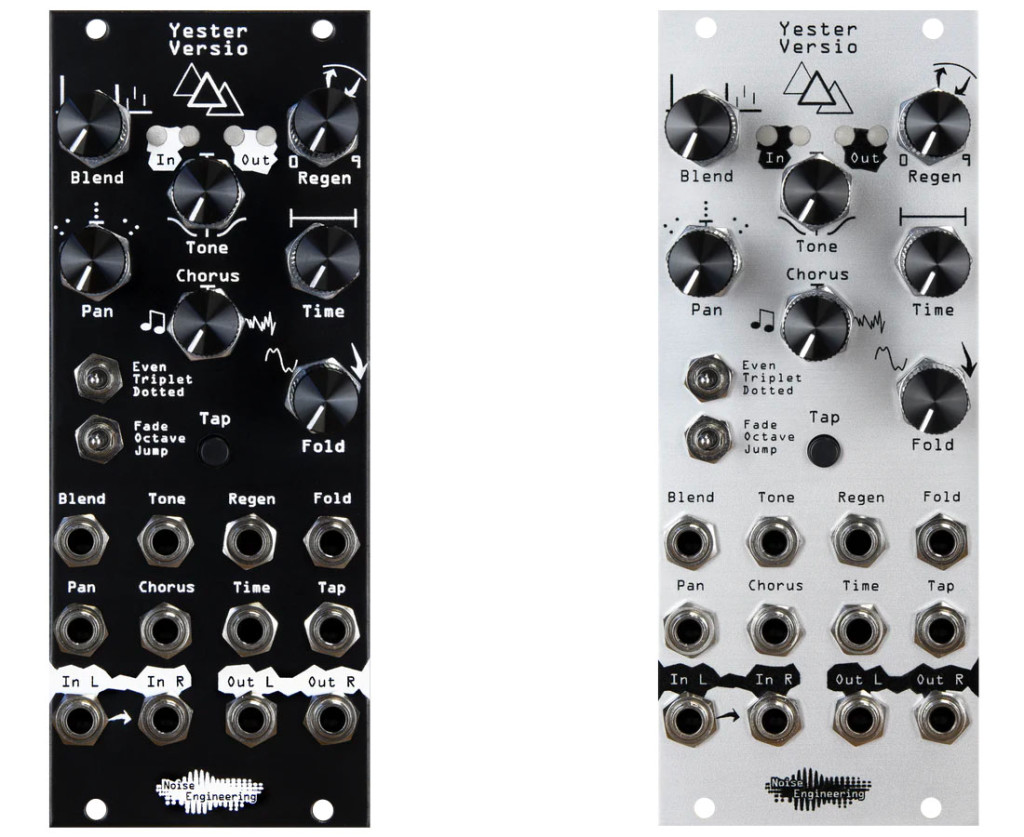Noise Engineering’s latest Versio is Yester: three-tap delay with tons of controls
Yester Versio adds a range of tone shaping and power controls to a three-tap delay, which looks like a promising package. It’s the latest addition to Versio, their line of stereo modules that let you swap out firmwares as you please – which means you might get them for free when they arrive this week.
Noise Engineering has two such platforms. Legio is the slimmer and cheaper; Version is the wider stereo version. The cost to get started with the latter is $393, but once you’ve done that you can swap out firmwares and even order matching pre-printed faceplates. (On the other hand, a laser cutter and a Sharpie might be more fun – same result as far as ease of use is concerned!) See below.
The earlier version starts out as a stereo three-tap delay, but of course this is noise engineering, so you can bet there’s features for intense feedback, modulation, wavefolding and more demise. I mean, the fun kind of mayhem and doom, not the “what’s in the news today” kind of mayhem and doom.
Here’s what you have – and yes, parameters and patch points for everything:
- wet/dry mix
- Sway
- delay feedback (“Rain” in noise engineering jargon), ranging from 0 – 95% (not like that Really stubborn rain they use for Desmodus plugin!)
- Time – free or synchronized, with even/triple/dotted on a three-way switch*
- Beat Sync button (plus tap input that inputs a clock)
- volume – Low pass to the left, high pass to the right. (They call this “DJ style” in the product description)
- Bipolar Choir – this is either constant pitch shift (turn left) for a nice harmonic effect or LFO + pitch shift for chorus (turn right)
- Fold – Saturation – Wavefolder (left), then “slightly chaotic sub-octaves” – the signature noise-engineering setting “Doom” (right)
- Fade/octave/jump Switch – ie fade/jump is obvious and determines repitching and artefacts; octave actually rate limit changes for octave harmonies, a little more rarely

Yesterday version
Now note that there is no Free/Sync switch per se, but that’s simple enough – they just treat it as a continuous free input when there’s no tap input (from the key or tap in), and quantize them as soon as you add clock or your own keystrokes. To be sure, I had to check the manual for this device:
When there is no clock input at the Tap jack and no tap tempo has been entered, this controls the rate of the internal delay clock. When a tap tempo is entered, this acts as a clock divider/multiplier in conjunction with the Even/Triplet/Dotted switch. Divisions are to the left of 12:00 and multiplications to the right.
That’s a nice solution. And while I’ve said before that I’m a big fan of Endorphin.es Ghost, if you really want to focus on the sound-shaping delay part – and there aren’t any weird button presses to remember – Yester Versio is probably a better option. The two could also complement each other due to their different approach but overlapping combination of stereo delay and tonal colouration.
Incidentally, what makes the custom firmwares on Noise Engineering’s platforms possible is libDaisy, so you can write your own firmware for the same platform. This saves you the work of building an entire module around Daisy, but if you’re really ambitious you can build it entirely yourself. (More on Daisy in a separate story.)
The version world Site covers hacking, updates, the works.
Versio was already looking good, but that might be the firmware overdoing it in my book. The combination of stereo delay, tone controls and noise engineering’s usual brutally destructive approach to convolution/distortion looks irresistible. I am already very happy with their Regio platform and for analog distortion with their Terci Ruina module.
But the ability to add a version to your setup and swap between some truly unique reverbs, distortions and delays seems ideal.
Affiliate Links: [CDM benefits from sales generated via our affiliate partners]
Ruina Version Stereo Distortion [Perfect Circuit]
Electus Versio Stereo Clocked Reverb [Perfect Circuit]
Desmodus Version Stereo Reverb [Perfect Circuit]
More:
Until now:
And to region: